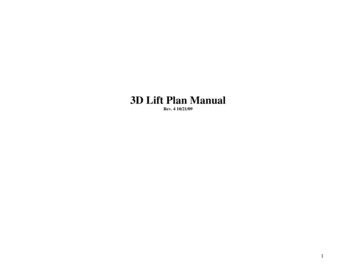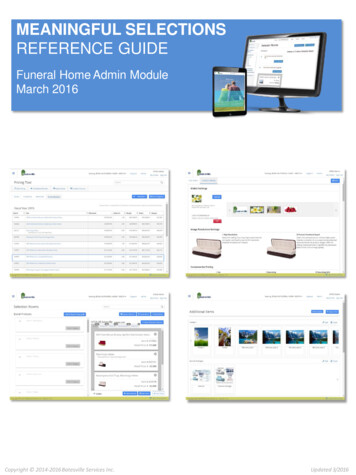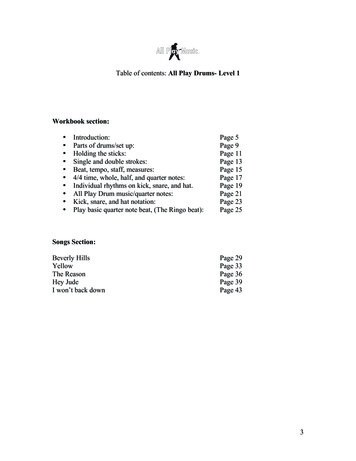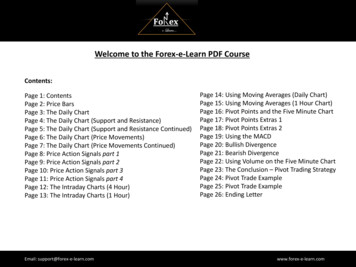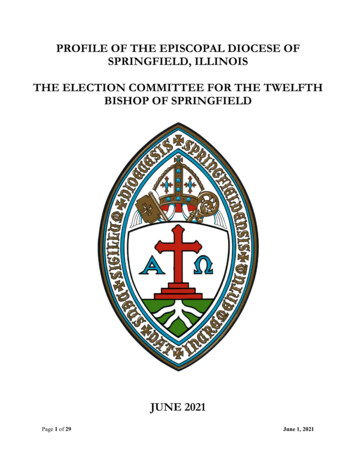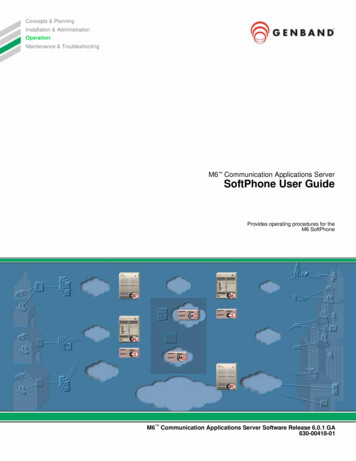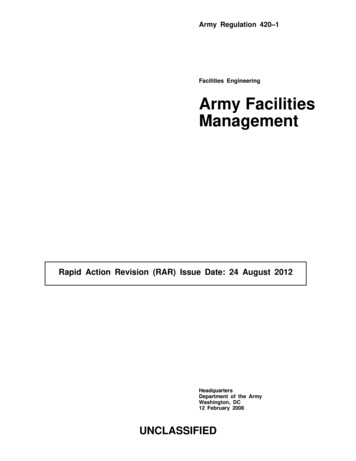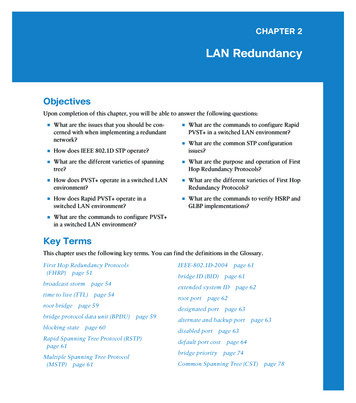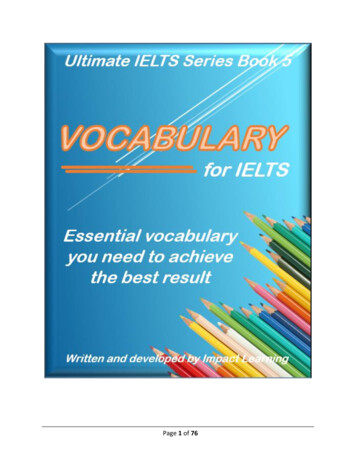
Transcription
Page 1 of 76
Table of contentsDealing with unknown vocabulary in IELTS. 3IELTS vocabulary by topic . 6IELTS vocabulary for a city environment . 6IELTS vocabulary for family . 9IELTS vocabulary for law . 10IELTS vocabulary for a city infrastructure . 12IELTS vocabulary for the environment . 15IELTS vocabulary for education . 17IELTS vocabulary for city people. 20IELTS vocabulary for communication . 22IELTS vocabulary for health . 24Common errors in IELTS writing – ‘government’ . 26IELTS vocabulary levels. 28IELTS vocabulary levels – practice exercises . 49Phrasal verbs and idioms in IELTS . 5912 useful idioms . 60Phrasal verbs with ‘read and write’ . 62Phrasal verbs with ‘read and write’ exercises . 65Tips for better spelling . 68Spelling rules in English . 69Top 10 tips for learning IELTS vocabulary . 72Page 2 of 76
Dealing with unknown vocabulary in IELTSA wide range of active vocabulary isabsolutely essential to get a good result –you need to be informal and relaxed in PartOne of the speaking test and in some GeneralTraining Task I writing questions, movingthrough semi formal and then to very formalfor Task II writing.However, one issue that is often overlooked is the need for passive vocabulary skills for thereading and listening. Often the answers are ‘hidden’ by using parallel expressions, synonymsand indirect constructions. That’s why it is essential to have not only a good vocabulary but aclear plan how to improve.When you meet new vocabulary, don’t panic! Avoid jumping straight to your dictionary – hereare five pointers that can help you.1 Context. Read the passage below. What do you think the word in italics means?In every country you visit, you will find a sport that captures the passions of the nation. NewZealand has its rugby supporters, England has its legions of football fans, the Japanese havetaken baseball to their hearts and Scotland still proudly supports its curling heroes.Click here to see the explanationYou know the subject of the paragraph is national sports. You can also see the pattern ofcountry or nationality followed by sport. Therefore, it is logical that curling is a sport.2 Contrast. Read the passage below. What do you think the word in italics means?Page 3 of 76
It should come as no surprise that younger people spend much of their leisure time on theirfeet, engaged in energetic activities, whereas older people opt for more sedentary pursuits likegoing to the theatre or watching television.Click here to see the explanationThe first clause talks about young people, energetic activities and being ‘on their feet’. Theword ‘whereas’ tells you that the second clause is a contrast, so sedentary must have theopposite meaning – not active or energetic, not ‘on their feet’.3 Explanation. Read the passage below. What do you think the word in italics means?There are many examples of the cooperation between people and dogs. Guide dogs, forexample, give essential assistance to the blind, while beagles, small dogs with short legs, areoften used by hunters.Click here to see the explanationIt is always a good idea to look closely at the sentence before and after vocabulary that isunfamiliar, as you often find that the word has been explained. From the passage, you knowthat beagles are ‘small dogs with short legs’.4 Word groups. Read the passage below. What do you think the word in italics means?In my opinion, boxing is an abhorrent sport. Modern society should be opposed to such violentcontact sports.Click here to see the explanationLook at the grammar. There is a subject (boxing), followed by the verb ‘to be’ (is), and thesentence ends with a noun (sport). So abhorrent must be an adjective of opinion and it followsfrom the second sentence that it has a negative meaning.Page 4 of 76
5 Logic. Read the passage below. What do you think the word in italics means?Although technology has made mountain climbing both safer and easier, it is not a sportwithout risks. Bad weather can come quickly and last for long periods and the effects ofseverely cold weather can lead to hypothermia and, if untreated, death.Click here to see the explanationThink about it! Use your own knowledge and experience to work it out – what happens topeople stuck in cold weather for long periods?Now use the skills presented on this page. Read the sentences below – what do you think thewords in italics mean?A English football supporters are often accused of being hooligans, although the majority areactually well-behaved fans who have no intention of causing trouble.B Although it can be a little expensive, thermal clothing is essential when skiing.C Pilates, a form of exercise, is becoming increasingly popular.D Children from impoverished families rarely have overseas holidays or modern toys.E When climbing Everest, Sir Edmund Hillary experienced some of the world’s harshest naturaldangers, such as freezing weather, sudden snowstorms, and even avalanches.Click here to see the answersA: Hooligans – not well behaved fans / do intend to cause troubleB: Thermal – warm clothingC: Pilates – a form of exercisePage 5 of 76
D: Impoverished – lack of money, poor (something that prevents overseas holidays or moderntoys)E: Avalanches – snow and ice sliding down a mountainNo matter what skills you apply, you may find a word or words that you still do not understand.If this happens, do not panic. Take a guess and move on. Do not spend too much time trying towork it out. It has been scientifically proven that the human brain is unable to process morethan 20 new words at a time before it starts to forget some. The best thing to do is to write 10new words with a definition and an example sentence in a pocket-sized notebook and have itwith you at all times. Waiting for the bus, sitting in a café or just relaxing at home – these are allgood opportunities to quickly take out the notebook and revise. When you are sure you arefamiliar with these words, write down 10 more and start again. Once a week, review all thevocabulary you have written in your notebook.Ready to practice your skills? Try this exercise (with complete reading text) to see if you canwork with unknown vocabulary.IELTS vocabulary by topicIELTS vocabulary for a city environmentEssential IELTS vocabulary split into common IELTS topics andsubsections. In this lesson, we are focusing on vocabulary used todescribe cities, particularly the city environment – the places,buildings and locations that you can refer to when talking orwriting about cities.Page 6 of 76
Take a look at the list below. How many words do you know? If there are any words you are notfamiliar with, we strongly recommend that you look them up in a dictionary. Once you havelooked through the list, try the vocabulary exercise that follows.1. cosmopolitan (environment)2. metropolitan (city)3. downtown4. city centre5. urban6. the suburbs / suburban areas7. rural8. the outskirts9. CBD (Central Business District)10.city hall11.coastal city12.inland city13.mountainous city14.housing15.accommodation16.housing complex17.industrial estate18.housing estate19.apartment (US) / flat (UK)20.house21.villa22.2-storey house23.5-level apartment building24.office tower25.skyscraper26.landmark(s) buildings27.marina28.port / harbour29.airport30.bus/train/air terminal31.urban sprawlUsing words from the list above, match a definition with a word:EXAMPLE: The ‘edge’ of the city, where it meets the countryside. ANSWER: Outskirts1. Opposite of rural2. The main area where most business is done in the city3. A city that has different influences from around the worldPage 7 of 76
4. Residential areas of cities, in other words, where people live5. An area with many factories6. Famous buildings that identify a city, such as the Eiffel Tower7. A very tall building8. The rapid growth of a city, often with adverse (negative) effects9. An area where a high concentration of people live10. The main area at which public transport stops or starts fromAnswers:1. Urban2. CBD or Central Business District3. Cosmopolitan4. Suburbs / suburban areas5. Industrial estate6. Landmarks / landmark buildings7. Skyscraper8. Urban sprawl9. Housing estate10. TerminalPage 8 of 76
IELTS vocabulary for familyEssential IELTS vocabulary split into common IELTS topics and subsections. In this lesson, we arefocusing on vocabulary used to describe families – the relationships between people, thestructure and type of family and more.Take a look at the list below. How many words do you know?We will soon be adding vocabulary exercises to these pages,but for now, we hope the lists help!Family connections Siblings – brothers or sisters Immediate family – generally considered to be siblings, parents and children. However,some people also include grandparents in this list Extended family – people with a connection to you within the family tree (aunts, uncles,cousins, nieces and nephews etc).Types of familyA. A nuclear family – a couple and their children (considered to be the ‘average’ familystructure). Statistically, a ‘nuclear family’ can currently has one mother, one father and2.2 children – the average family unit)B. A matriarchal family – (can also be used to describe a society) – where themother/female is considered to be the most important personC. A patriarchal family (can also be used to describe a society) – where the father/male isconsidered to be the most important personD.Single parent family – where the child/children has only a mother or fatherE. Same-sex parents – these are parents who are either both male (gay) or female(lesbian).Connecting families and peoplePage 9 of 76
Genealogy – studying the family history back into the past, often by hundreds and eventhousands of years, to see where someone’s bloodline originally came from Family tree – a diagram that represents all the members of a family Lineage – the sequence of people before you (father grandfather great grandfatherand so on).IELTS vocabulary for lawEssential IELTS vocabulary split into common IELTS topics and subsections. In this lesson, we arefocusing on vocabulary used to describe the law – crimes, criminals, the legal system and more.Take a look at the list below. How many words do you know? Wewill soon be adding vocabulary exercises to these pages, but for now, we hope the lists help!Degrees of crimeA. Misdemeanour – A minor crime, punishable by a fine or a light jail termB. Felony [US English] – a crime punishable by death or imprisonment in excess of oneyear.C. Infraction – generally used to describe minor crimes when the law has been broken (e.g.riding a bicycle at night without lights – it’s breaking the law, but you’re not going toprison for it!)PunishmentA. Capital punishment (the death penalty) – being put to death by the state for crimescommittedPage 10 of 76
B. Incarcerated – a formal word meaning ‘to be put in prison’C. Suspended sentence – a person can be found guilty but their time in prison is delayedfor a period of time. Often is a person has not broken the law within a given period, theprison time is dismissed.D.Maximum security – a prison where there prisoners are watched very closely andchances of escape are very low (compare this to minimum security prisons, which aregenerally more relaxed and reserved for lesser crimes)E. Damages – this is where the person or company accused of the crime is found guilty andrequired to pay money to the person / people they have wronged.Types of crimeNOTE: There are hundreds of different types of crime – the list below covers only the wordswe think will be most useful in your IELTS test! White collar crime – this refers to non-violent crimes done for money, generally bybusiness and government professionals. Homicide – a more formal (legal) term for murder Larceny – a more formal (legal) term for theft Arson – setting fire to buildings or other property Embezzlement – taking money which the person has been trusted to look after(commonly when people steal money from the company they work for) Forgery – making illegal copies of official documents Fraud – to deceive (trick) someone for illegal gain Hate crime – a crime against a person because of a social group they are considered tobelong to (could be race, colour, religion etc)The people involved Judge – the person responsible for deciding the punishment for a guilty person Defendant – the person in a trial who has been accused of a crimePage 11 of 76
Prosecution – the people who are trying to prove that the defendant is guilty Jury – 12 people who attend a trial and then decide whether the accused person isinnocent or guilty. Witness – people that are brought into a trial to give evidence (this can be for thedefendant, against the defendant of simply to give factual evidence) Attorney / barrister – these are law professionals that will often be present in court,either defending or prosecuting a case.The legal process To arrest someone – to take someone into custody A trial – when the evidence against the accused person is considered by a judge and jury Verdict – the decision as to whether the defendant is innocent or guilty Appeal – when the final decision made by the judge is challenged Confession – when the accused person admits they are guilty Testimony – a written or spoken statementMiscellaneous vocabulary for the law Immunity – when a criminal is not prosecuted for their crime(s) in exchange for theirtestimony about another criminalIELTS vocabulary for a city infrastructureEssential IELTS vocabulary split into common IELTS topics andsubsections. In this lesson, we are focusing on vocabulary used todescribe cities, particularly the city environment – the places,buildings and locations that you can refer to when talking orwriting about cities.Page 12 of 76
Take a look at the list below. How many words do you know? If there are any words you are notfamiliar with, we strongly recommend that you look them up in a dictionary. Once you havelooked through the list, try the vocabulary exercise that follows.Public transportation:1. subway/underground/train/metro/light rail/ferry/Tube (UK English)2. mass transit/queueSanitation: landfill waste disposalinfrastructure: electricity sewage water power telecommunicationsAmenities:1. parks/libraries/clubs/zoos2. megacentres/malls/boutiques3. theatres/cinema complex/galleries/botanical gardensRoads and traffic traffic jam(s) (heavy) traffic congestion motorway (UK English) freeway (US English)Page 13 of 76
highway lane/road/street/boulevard/avenuePollutionA noise pollutionB light pollutionC Smog1) The basic, and essential, facilities and services of a city such as bridges, roads and powersupplies2) Slow-moving traffic, because of too many vehicles3) Waste water that needs to be safely removed from housing areas and cleaned4) Where rubbish is buried in a hole and then eventually covered with earth5) In many cities, the residents cannot see the night sky clearly because streets lamps and otherfactors cause too much6) The British English word for a train service, often underground, that helps commute getaround a city (most commonly in London)7) A thick layer of pollution that hangs over a city, often looking like bad weather / grey skyAnswers:1. Infrastructure2. Traffic jam OR traffic congestionPage 14 of 76
3. Sewage4. Landfill5. Light pollution6. The Tube7. SmogIELTS vocabulary for the environmentEssential IELTS vocabulary split into common IELTS topics and subsections. In this lesson, we arefocusing on IELTS vocabulary for the environment – pollution, solutions to the problem etc.Take a look at the list below. How many words do you know? We will soon be addingvocabulary exercises to these pages, but for now, we hope the lists help!Other words for environment habitat – the natural home of an animal or plant the natural world – used when talking about nature ecology – the relationship between animals and plants to their natural environment Dwelling – place where animals or plants liveEnvironmental issues Deforestation – clearing trees; changing forest into bareland Overpopulation – when there are too many of a species,more than available resources can support Intensive farming – farming techniques that can have a long term effect on the landPage 15 of 76
Extinction – where an entire species of animal or plant is completely killed off; there areno more on the planet Greenhouse effect – where the sun’s warmth is trapped inside the atmosphere due togreenhouse gases Renewable energy – where electricity is generated from sources that are not reduced byusing them (e.g. hydro power or solar power) Fossil fuels – a natural fuel that often has an environmental impact when used (coal, gasand oil)Types of pollution / other words you can use Acid rain – this is caused by rain becoming acidic due to air pollution contamination – this is where something is damaged or affected by another form ofpollution (a secondary effect) Emissions – these are gases that are released into the atmosphere (e.g. car exhaustemissions) Soil erosion – when soil is easily washed away because trees or other plants are nolonger holding it in place. Commonly happens after deforestation Toxic waste – this is the by product of producing something that is dangerous to theenvironment. Nuclear power has a lot of toxic waste. Smog – a thick form of air pollution that is like a fog (common in many large cities likeLondon or Beijing)Solutions to environmental problems Recycling – converting waste into something that is reusable Conservation – to keep something safe / protected; preventing damage of injury biodegradable – packaging or a product that decay (break down) naturally andharmlessly, therefore avoiding pollutionPage 16 of 76
Preservation – this is similar to conservation. The main difference is that conservationdoes allow changes that are not dangerous – preservation aims to maintain the presentcondition without changes. sustainable development – economic development where natural resources are used ina limited way and can therefore continue (e.g. planting new trees after cutting downexisting trees)The people involved Activists – people who campaign for the environment / environmental protection(Greenpeace, for example) Conservationists – people who acts to protect the environment. NOTE: we do not usethe word ‘preservationist’IELTS vocabulary for educationEssential IELTS vocabulary split into common IELTS topics and subsections. In this lesson, we arefocusing on vocabulary used to describe education – schools, teachers, subjects and more.Take a look at the list below. How many words do youknow? We will soon be adding vocabulary exercises tothese pages, but for now, we hope the lists help!Types of schools Boarding school – where the students live, eat and sleep during the school term Private school – where parents have to pay for their child to enrol Public school [US English] – a school which is free and paid for by the government Public school [UK English] – an exclusive, expensive school, run independentlyPage 17 of 76
Co-education – where male and female students study together (also referred toinformally as a co-ed school) Single-sex school – where only male or only female students attendTypes of education Primary education Secondary education Tertiary education (also referred to as Higher education) – this is the first level ofschooling that is not compuslory (you don’t have to go). This includes universities andcollegesTypes of certification1. A certificate – issued for a short course2. A diploma – issued for a course that is shorter than a degree3. A degree – issued by a university at the end of longer course of study4. A masters (degree) – issued by a university when the students has completed furtherstudy beyond a degree (often in a more specialised field than a degree)5. A doctorate – this is the highest level of study issued by a universitySchool behaviour / character types / types of student1. to play truant – to be absent from class without permission from parents or teachers2. a bookworm – an informal word for someone who spends a lot time reading / studying3. an academic – someone who is more comfortable with studying and writing rather thanworking with their hands in a more practical application4. a scholar – a relatively old fashioned word for an academic5. a mature student – someone who is older than the average student, often having goneback to college or universities after working or having a family6. a freshman [US English] – someone in their first year of university or college7. a sophomore – someone in their second year of university or collegePage 18 of 76
8. an undergraduate – someone who has not yet completed their degree9. a graduate (also referred to as a postgraduate) – someone who has complete degreeTypes of learning Distance learning – this is done away from the school, where the student studies bythemselves and rarely attends classes in a school building (lessons are sent by post oronline) Online learning – this is generally 100% online, where you will not physically meet ateacher or attend classes in a school building Intensive courses – fast paced courses which give a lot of information quickly and in ashort time Rote learning – a teaching style used in some countries / subjects where students simplyrepeat what they are told until they have memorised it. Lecture – often for larger groups of people, the focus is on hearing the teacher speakand making notes Tutorial – smaller groups of students, where students can ask questions (often followinga lecture)The cost of education tuition fees – the money paid for education a grant – money given by the government to support a student while studying a student loan – money which a student can borrow to while they are studying, butwhich has to be repaid a scholarship – money (often given by the institution themselves) to support a studentwhile studyingThe language of studying / useful collocations to revise – study or read something again in order to remember it better, often beforeexamsPage 19 of 76
to concentrate – to focus your attention on something to review – read over something again. Similar to revise, but more commonly done justafter something and not in preparation for an exam to plagiarise – to copy another persons work without giving them credit or identifyingthe course to sit / take a test to attend a class to meet a deadlineMiscellaneous vocabulary for education literacy – the ability to read and write curriculum – the order in which subjects and topics are studied in a school (like atimetable)IELTS vocabulary for city peopleEssential IELTS vocabulary split into common IELTS topics andsubsections. In this lesson, we are focusing on vocabulary used todescribe cities, particularly the people that live in cities.Take a look at the list below. How many words do you know? If thereare any words you are not familiar with, we strongly recommend that you look them up in adictionary. Once you have looked through the list, try the vocabulary exercise that follows.4. residents1. city-dwellers5. commuters2. inhabitants6. overcrowded3. citizens7. urban lifestylePage 20 of 76
8. densely-populated9. sparsely-populated10.high-density housing11.mayor12.the civic authorities13.city council14.local community15.neighbourhood16.internal migrantsPage 21 of 76
1) A word used to specifically describe people that live in cities.2) People who travel to work in the morning, and home in the evening.3) People who move from the countryside to the city in the same country.4) The leader of the city.5) The local government of a city, ‘the civic‘6) Areas where a high number of people all live in a small area of land.Answers:1. City dwellers (residents, inhabitants and citizens all refer to people, but notspecifically people in a city)2. Commuters3. Internal migrants4. Mayor5. authorities6. densely-populatedIELTS vocabulary for communicationEssential IELTS vocabulary split into common IELTS topics and subsections. In this lesson, weare focusing on vocabulary used to describe communication – how we communicate, thewords we use, non-verbal communication and more.Take a look at the list below. How many words do you know?Page 22 of 76
Types of spoken communication A discussion – when two or more people discuss aspecific matter. It is often a formal situation wheretopics are discussed, often from different points ofview. A conversation – where two or more people talkinformally. There may not be a specific topic to discuss or different points of view. A dialogue – very similar to a discussion, although often more formal and with theaim of finding a solution to a specific problem. An interview – a formal meeting where a person is asked questions and theiranswers are either evaluated or reported. A monologue – a single person speaking for a prolonged period. This is often used inacting, but can also indicate that someone has dominated the conversation and it isonly them speaking. A speech – when a speaker talks in front of an audience for a given purpose (e.g. awedding speech). A lecture – a speech given to an audience or class, especially for teaching purposes A debate – similar to a discussion, but often used as a formal contest of differentpoints of view (e.g. a political debate)Communicating without speaking Body language – how a person positions themselves (e.g. facing someone, looking atthe floor, crossing their arms) that tells us how someone feels. Non-verbal communication – similar to sign language, but this can be clear, prearranged signals. A policeman directing traffic, for example, often uses his/her armsto tell drivers where to go, when to stop etc – this is non-verbal communication. Sign language – use of the hands to show words and meaning used by (and tocommunicate to) deaf people.LanguagePage 23 of 76
A. Mother tongue – (also called ‘Native language’ or ‘First language’) this is thelanguage you were brought up listening to and speakingB. Bilingual – the ability to speak fluently and accurately in two languagesC. Multilingual – the ability to speak fluently and accurately in more than twolanguagesD.Polyglot – a person who is multilingualTypes of communicator / listener1. Active listener – someone who listens and asks feedback questions to make surethey understood.2. Inattentive – someone who does not pay close attention to what is being said orshownMiscellaneous vocabulary for communication1. Gossip – talking about the personal or private affairs of other people (often basedonly in rumours, not facts).2. Hint – an indirect clue or indication, something not said directly (e.g. ‘she hinted thatshe would like a new computer for her birthday, but didn’t say so directly’).3. Confession – admitting something that was wrong, illegal or shameful (he gave aconfession to the police about the car he stole)IELTS vocabulary for healthEssential IELTS vocabulary split into common IELTS topics and subsections. In this lesson, weare focusing on vocabulary used to describe health – people that work in the health service,common illnesses, types of healthcare and more.Page 24 of 76
Take a look at the list below. How many words do youknow? We will soon be adding vocabulary exercises tothese pages, but for now, we hope the lists help!Types of healthcare Alternative healthcare – this is a term used bymany western countries to describe more traditional types of healthcare that do notinvolve operations and pharmaceutical drugs. For example, acupuncture (see below). Western medicine – the type of medical treatment that is the most popular in NorthAmerica and many European countries, based on the use of drugs and surgery totreat signs of illness.Types of treatment / therapy Acupuncture – needles are inserted into the body at certain pressure points Chemotherapy – fighting a disease using toxic chemical substances (commonly usedagainst cancer) Naturopathy – using natural ingredients (flowers etc) to heal sickness.The
IELTS vocabulary for family Essential IELTS vocabulary split into common IELTS topics and subsections. In this lesson, we are focusing on vocabulary used to describe families - the relationships between people, the structure and type of family and more. Take a look at the list below. How many words do you know?

